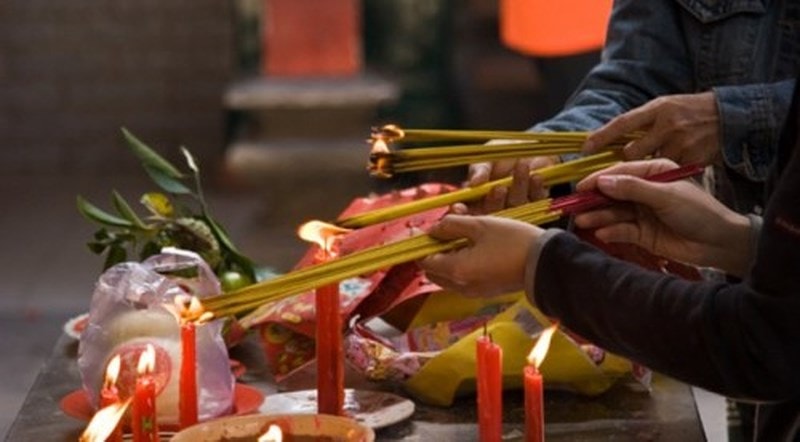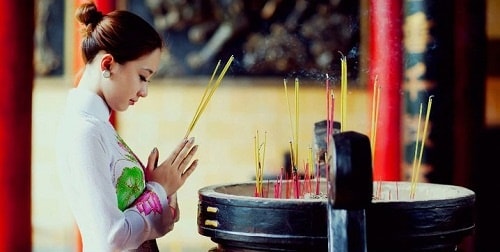4 outdoor rituals to do on the 15th day of the first lunar month
(Baonghean.vn) - According to the Vietnamese people's morality of remembering the source of water when drinking, on the 15th day of the first lunar month, in addition to the ancestor worship ceremony, Vietnamese people often hold ceremonies to thank Gods, Buddhas, Saints, wise Kings, and great ministers who worked for the people and the country.
The full moon of January is traditionally called the Lantern Festival. The Lantern Festival means the first full moon night of the new year. “Nguyen” means first, “tieu” means night. The Lantern Festival is also called the Thuong Nguyen Festival, because there is also the Trung Nguyen Festival (the full moon of the seventh lunar month) and the Ha Nguyen Festival (the full moon of the tenth lunar month).
Tet Nguyen Tieu is an important holiday, so our grandparents have a saying: "Worshiping all year round is not as good as the 15th day of the first lunar month" or "Worshiping Buddha all year round is not as good as the 15th day of the first lunar month".
According to the Vietnamese people's morality of remembering the source of water, on the 15th day of the first lunar month, in addition to the ancestor worship ceremony, Vietnamese people often hold ceremonies to thank Gods, Buddhas, Saints, wise Kings, and great ministers who served the people and the country.
 |
| Each outdoor offering tray usually has 9 incense sticks lit. Illustration photo/Internet source |
To thank Heaven and Earth, Gods, Buddhas, Saints, and national heroes, Vietnamese people often prepare 4 outdoor offerings. Each family prepares the offerings according to their conditions. We only need to make a pot of tea, a few cups of light wine, fruits from the garden, and a few incense sticks with sincerity.
If the ancestral altar has 1 or 5 incense sticks, each outdoor altar has 9 incense sticks.
Offering tray facing East:To commemorate the Emperors, Saints, and high-ranking mandarins and scholars who have contributed to the people and the country. Light 9 incense sticks and bow 9 times.
South-facing altar:To show respect and gratitude to the Gods. Light 9 incense sticks and bow 9 times.
West-facing altar:To pay respect to Buddha. Light 9 incense sticks, bow 9 times and say:
Altar facing North:To pay homage to God, the Five Emperors, the Great Immortals, and the gods, generals, heavenly soldiers, and heavenly horses.
In addition, according to Buddhist tradition, the 15th day of the first lunar month is when Buddha descended, so this is the time when many people go to the pagoda on this occasion.
What should I pray for when going to the temple?
The ancients came to worship Buddha with a heart of respect for Buddha, wishing to follow what Buddha taught. The devotees came to seek the truth, expressing a heart of not being afraid of difficulties, not being afraid of suffering, only wishing to attain enlightenment.
Ordinary people also take the opportunity to worship Buddha to repent for their sins, and pray for a chance to atone for their wrongs, do good deeds, and help others.
 |
| Sincerely. Illustration photo/Internet source |
Things you should not pray to God or Buddha:
No need for smooth sailing
Difficulties are something everyone must go through in life, thanks to which they can become more mature. Therefore, do not pray for no obstacles, let yourself be able to overcome the storms to become strong and resilient.
Don't pray for love
According to Buddhist philosophy, fate is not something that can be forced. Not to mention love, but even the fate of parents and children is only limited to this life. Who can carry that fate with them? Buddha guides people to liberation from the cycle of reincarnation, which is also liberation from karmic debts and resentments.
Do not seek fame and fortune
Remember, fame and wealth are illusory and make people greedy and arrogant, willing to abandon virtue for personal gain. Fame and wealth are inherently empty, and the ambition for fame and wealth can easily lead to reincarnation.
Do not seek benefits for yourself.
If everyone only seeks benefits for themselves and losses for others, then they will lose their humanity. Surely no God or Buddha can help such people.
Don't ask others to help you.
Asking others for help will make you dependent and unable to overcome adversity on your own. Moreover, people who always ask others for help will live with a mentality of always being indebted and suffering, not being free and independent.
After the thanksgiving ceremony, one should go to the monks' house or the reception room to visit the monks and abbots and make merit as one pleases.
Note when doing merit:Just put the money in the donation box, no need to get a certificate of merit. If you do take it, you should not bring it home to place on your family altar to report your merit, but should burn this paper money. All real money should be put in the main donation box. Do not "spread" money on all altars or put it in the hands of statues.


